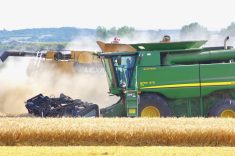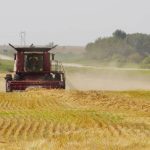Optimism in the agricultural sector has many Prairie farmers looking to add to their land-base this spring. That strong demand, together with a lack of willing sellers, is causing land prices to continue to move higher across Western Canada, according to real estate agents specializing in farmland.
"There seems to be new people every day looking to buy more acres," said real estate agent Grant Tweed, of Century 21 West-Man Realty at Brandon, Man., noting the demand was largest for good grain land. While strength in the cattle market was also helping the market for pastureland see some improvement, the gains there were not as large.
Read Also

U.S. grains: Grains off highs with fed in focus, soyoil down more than two per cent
Chicago | Reuters – Chicago corn and soybean futures sagged on Wednesday, retreating from multi-week highs on profit-taking and an…
"Every sale seems to set a new plateau, with land that was $1,500 (per acre) a year ago probably drawing $2,000 right now," said Tweed.
Farmers benefitting from good commodity prices are looking to add to their operations, with "a lot of cash floating around looking for a home," said Tweed. He said more younger farmers were also looking to get into the industry.
"For grain land — we can’t get enough to sell," said Harold Goritz of Winnipeg-based Delta Real Estate, adding that what does come on the market is not there for long and sells for "higher prices than we’re used to."
Goritz said the price of grain land is unlikely to go down, but a downturn in commodity prices could at least slow the upward move in land values. Demand for pasture land is also starting to improve, he added.
"There’s a real interest in land at this time," said Bob Lane of Lane Realty in Regina. "At the same time, a lot of people are happy to own their land." Lane said high commodity prices are making for a good market for both the seller and the buyer.
When property comes on the market it sells quickly — where in other years it may have taken a longer time, said Lane.
The demand for land is coming from both local farmers looking to expand their existing operations, and buyers from other parts of the country, according to the real estate agents.
Lane said the strong Canadian dollar and weaker euro has slowed some of the demand from European buyers who had shown considerable interest in Western Canada in recent years. However, he said the international interest these days was coming primarily from South Africa.
Land prices have risen to the extent where it is not as profitable to buy land and rent it out, as the returns are better in other investments, said Lane.
That said, the demand for rental land is there, and many retiring farmers with land to rent out are choosing to do just that.













